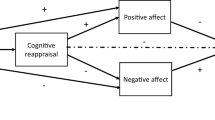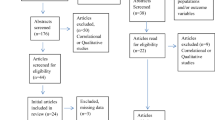Abstract
Purpose
Theory suggests that binge eating symptoms may develop in an attempt to avoid distressing states that arise in the context of negative affect. In light of its theoretical significance, including the “escape from awareness” model of binge eating, surprisingly few empirical evaluations have examined the empirical evidence for this variable in relation to anxiety and binge eating symptoms. In addition, although it is understood that anxiety is more prevalent among women than men, empirical investigations of gender differences in cognitive avoidance in binge eating are thus far absent from the published literature.
Methods
Participants (N = 436) were recruited from diverse geographic regions across the United States to take part in an online study. Cognitive avoidance, anxiety, and binge eating measures were collected.
Results
Cognitive avoidance partially mediated the relation between anxiety and binge eating in the full sample; however, results differed across genders. Specifically, cognitive avoidance was a mediator for women, but not for men.
Conclusions
Findings support the “escape from awareness” model of binge eating among women, and suggest that targeting cognitive avoidance in binge eating treatment may be a promising clinical avenue. Future research may benefit from exploring the broader construct of experiential avoidance to determine if the gender differences in cognitive avoidance observed in this study are indicative of a larger pattern of avoidance behavior, and if factors other than cognitive avoidance may have greater relevance for men.
Similar content being viewed by others
References
Hudson JI, Hiripi E, Pope HG Jr, Kessler RC (2007) The prevalence and correlates of eating disorders in the national comorbidity survey replication. Biol Psychiatry 61(3):348–358. doi:10.1016/j.biopsych.2006.03.040
American Psychiatric Association (2013) Diagnostic and statistical manual of mental disorders, fifth edition (DSM-5). American Psychiatric Association, Arlington
Striegel-Moore RH, Wilfley D, Pike KM, Dohm F, Fairburn CG (2000) Recurrent binge eating in black american women. Arch Fam Med 9:83–87. doi:10.1001/archfami.9.1.83
Javaras KN, Pope HG Jr, Lalonde JK, Roberts JL, Nillni YI, Laird NM, Bulik CM, Crow SJ, McElroy SL, Walsh BT, Tsuang MT, Rosenthal NR, Hudson JI (2008) Co-occurrence of binge eating disorder with psychiatric and medical disorders. J Clin Psychiatry 69:266–273
Reichborn-Kjennerud T, Bulik CM, Sullivan PF, Tambs K, Harris JR (2004) Psychiatric and medical symptoms in binge eating in the absence of compensatory behaviors. Obes Res 12(9):1445–1454. doi:10.1038/oby.2004.181
Rosenbaum DL, White KS (2015) The relation of anxiety, depression, and stress to binge eating behavior. J Health Psychology 20(6):887–898. doi:10.1177/1359105315580212
Heatherton TF, Baumeister RF (1991) Binge eating as escape from self-awareness. Psychol Bull 110:86–108. doi:10.1037//0033-2909.110.1.86
Pallister E, Waller G (2008) Anxiety in the eating disorders: understanding the overlap. Clin Psychol Rev 28:366–386. doi:10.1016/j.cpr.2007.07.001
Napolitano MA, Himes S (2011) Race, weight, and correlates of binge eating in female college students. Eat Behav 12:29–36. doi:10.1016/j.eatbeh.2010.09.003
Stein RI, Kenardy J, Wiseman CV, Dounchis JZ, Arnow BA, Wilfley DE (2007) What’s driving the binge in binge eating disorder?:a prospective examination of precursors and consequences. Int J Eat Disord 40:195–203. doi:10.1002/eat.20352
Engelberg MJ, Steiger H, Gauvin L, Wonderlich SA (2007) Binge antecedents in bulimic syndromes: an examination of dissociation and negative affect. Int J Eat Disord 40(6):531–536. doi:10.1002/eat.20399
Lillis J, Hayes SC, Levin ME (2011) Binge eating and weight control: the role of experiential avoidance. Behav Modif 35(3):252–264. doi:10.1177/0145445510397178
Barnes RD, Masheb RM, White MA, Grilo CM (2013) Examining the relationship between food thought suppression and binge eating disorder. Compr Psychiatry 54(7):1077–1081. doi:10.1016/j.comppsych.2013.04.017
Deaver CM, Miltenberger RG, Smyth J, Meidinger A, Crosby R (2003) An evaluation of affect and binge eating. Behav Modif 27(4):578–599. doi:10.1177/0145445503255571
Mussell MP, Mitchell JE, De Zwaan M, Crosby RD, Seim HC, Crow SJ (1996) Clinical characteristics associated with binge eating in obese females: a descriptive study. Int J Obes 20(4):324–331
Yanovski SZ, Nelson JE, Dubbert BK, Spitzer RL (1993) Association of binge eating disorder and psychiatric comorbidity in obese subjects. Am J Psychiatry 150(10):1472–1479
Fairburn CG, Cooper Z, Cooper PJ (1986) The clinical features and maintenance of bulimia nervosa. In: Brownell KD, Foreyt JP (eds) Handbook of eating disorders: physiology, psychology and treatment of obesity, anorexia and bulimia. Basic Books, New York, pp 389–404
Mitchell JE, Mussell MP, Peterson CB, Crow S, Wonderlich SA, Crosby RD, Davis T, Weller C (1999) Hedonics of binge eating in women with bulimia nervosa and binge eating disorder. Int J Eat Disord 26:165–170. doi:10.1002/(SICI)1098-108X(199909)26:2<165:AID-EAT5>3.3.CO;2-8
Kessler RC, Berglund PA, Demler O, Jin R, Walters EE (2005) Lifetime prevalence and age-of-onset distributions of DSM-IV disorders in the National Comorbidity Survey Replication (NCS-R). Arch Gen Psychiatry 62(6):593–602
Barnes RD, Tantleff-Dunn S (2010) Food for thought: examining the relationship between food thought suppression and weight-related outcomes. Eat Behav 11:175–179
Lovibond PF, Lovibond SH (1995) Manual for the depression anxiety stress scales. Psychology Foundation of Australia, Sydney
McDowell I (2006) Measuring health: a guide to rating scales and questionnaires, 3rd edn. Oxford University Press, New York
Henry JD, Crawford JR (2005) The short-form version of the depression anxiety stress scales (DASS-21): construct validity and normative data in a large non-clinical sample. Br J Clin Psychol 44:227–239. doi:10.1348/014466505X29657
Antony MM, Bieling PJ, Cox BJ, Enns MW, Swinson RP (1998) Psychometric properties of the 42-item and 21-item versions of the depression anxiety stress scales in clinical groups and a community sample. Psychol Assess 10:176–181
Wegner DM, Zanakos S (1994) Chronic thought suppression. J Pers 62:615–640
Stice E, Telch CF, Rizvi SL (2000) Development and validation of the eating disorder diagnostic scale: a brief self-report measure of anorexia, bulimia, and binge-eating disorder. Psychol Assess 12:123–131. doi:10.1037//1040-3590.12.2.123
Whiteside U, Chen E, Neighbors C, Hunter D, Lo T, Larimer M (2007) Difficulties regulating emotions: do binge eaters have fewer strategies to modulate and tolerate negative affect? Eat Behav 8(2):162–169. doi:10.1016/j.eatbeh.2006.04.001
Dunn EC, Neighbors C, Larimer M (2003) Assessing readiness to change binge eating and compensatory behaviors. Eat Behav 4(3):305–314. doi:10.1016/S1471-0153(03)00023-0
Stice E, Fisher M, Martinez E (2004) Eating disorder diagnostic scale: additional evidence of reliability and validity. Psychol Assess 16(1):60–71. doi:10.1037/1040-3590.16.1.60
IBM Corp. (2012) IBM SPSS Statistics for Windows, Version 21.0. IBM Corp., Armonk, NY
Hayes AF (2013) Introduction to mediation, moderation and conditional process analysis. Guilford Press, New York
Binford RB, Mussell MP, Peterson CB, Crow SJ, Mitchell JE (2004) Relation of binge eating age of onset to functional aspects of binge eating in binge eating disorder. Int J Eat Disord 35:286–292. doi:10.1002/eat.10272
Sierra-Baigrie S, Lemos-Giráldez S, Paino M, Fonseca-Pedrero E (2012) Exploring the relationship between coping strategies and binge eating in nonclinical adolescents. Eur Eat Disord Rev 20(1):e63–e69
Sulkowski ML, Dempsey J, Dempsey AG (2011) Effects of stress and coping on binge eating in female college students. Eat Behav 12(3):188–191. doi:10.1016/j.eatbeh.2011.04.006
Stickney MI, Miltenberger RG, Wolff G (1999) A descriptive analysis of factors contributing to binge eating. J Behav Ther Exp Psychiatry 30(3):177–189. doi:10.1016/S0005-7916(99)00019-1
Kaye WH, Gwirtsman HE, George DT, Weiss SR, Jimerson DC (1986) Relationship of mood alterations to bingeing behaviour in bulimia. Br J Psychiatry 149(4):479–485. doi:10.1192/bjp.149.4.479
Blackburn S, Johnston L, Blampied N, Popp D, Kallen R (2006) An application of escape theory to binge eating. Eur Eat Disord Rev 14(1):23–31. doi:10.1002/erv.675
Paxton SJ, Diggens J (1997) Avoidance coping, binge eating, and depression: an examination of the escape theory of binge eating. Int J Eat Disord 22(1):83–87
Lingswiler VM, Crowther JH, Stephens MAP (1989) Affective and cognitive antecedents to eating episodes in bulimia and binge eating. Int J Eat Disord 8:533–539. doi:10.1002/1098-108X(198909)8:5<533:AID-EAT2260080505>3.0.CO;2-O
Meyer C, Serpell L, Waller G, Murphy F, Treasure J, Leung N (2005) Cognitive avoidance in the strategic processing of ego threats among eating-disordered patients. Int J Eat Disord 38(1):30–36. doi:10.1002/eat.20147
McLean CP, Asnaani A, Litz BT, Hofmann SG (2011) Gender differences in anxiety disorders: prevalence, course of illness, comorbidity and burden of illness. J Psychiatr Res 45(8):1027–1035. doi:10.1016/j.jpsychires.2011.03.006
Addis ME, Cohane GH (2005) Social scientific paradigms of masculinity and their implications for research and practice in men’s mental health. J Clin Psychol 61(6):633–647. doi:10.1002/jclp.20099
Holmes M, Fuller-Tyszkiewicz M, Skouteris H, Broadbent J (2015) Understanding the link between body image and binge eating: a model comparison approach. Eat weight disord EWD 20(1):81–89. doi:10.1007/s40519-014-0141-4
Kristeller JL, Wolever RQ (2011) Mindfulness-based eating awareness training for treating binge eating disorder: the conceptual foundation. Eat Disord 19(1):49–61
Courbasson CM, Nishikawa Y, Shapira LB (2011) Mindfulness-action based cognitive behavioral therapy for concurrent binge eating disorder and substance use disorders. Eat Disord 19(1):17–33
Dalen J, Smith BW, Shelley BM, Sloan AL, Leahigh L, Begay D (2010) Pilot study: mindful eating and living (MEAL): weight, eating behavior, and psychological outcomes associated with a mindfulness-based intervention for people with obesity. Complement Ther Med 18(6):260–264. doi:10.1016/j.ctim.2010.09.008
Author information
Authors and Affiliations
Corresponding author
Ethics declarations
Conflict of interest
On behalf of all authors, the corresponding author states that there is no conflict of interest.
Ethical approval
All procedures performed in studies involving human participants were in accordance with the ethical standards of the institutional and/or national research committee and with the 1964 Helsinki declaration and its later amendments or comparable ethical standards.
Informed consent
Informed consent was obtained from all individual participants included in the study.
Rights and permissions
About this article
Cite this article
Rosenbaum, D.L., White, K.S. Does cognitive avoidance mediate the relation of anxiety and binge eating?. Eat Weight Disord 21, 653–659 (2016). https://doi.org/10.1007/s40519-016-0284-6
Received:
Accepted:
Published:
Issue Date:
DOI: https://doi.org/10.1007/s40519-016-0284-6




